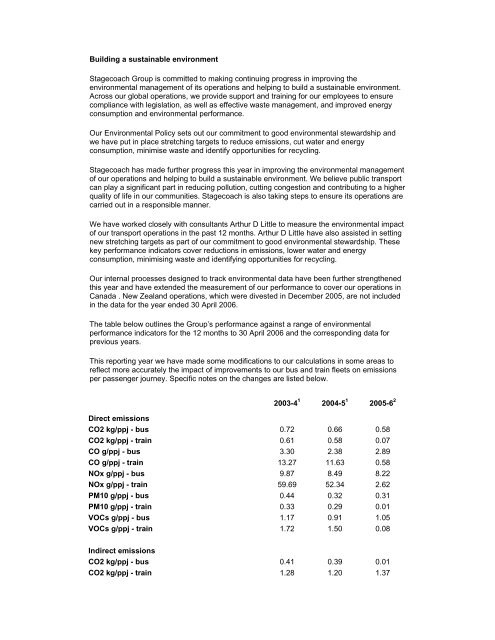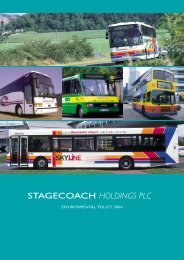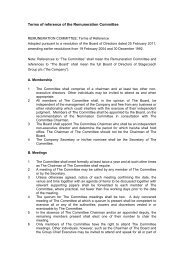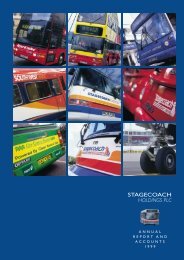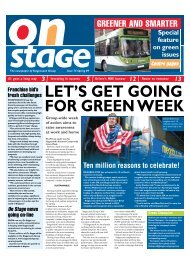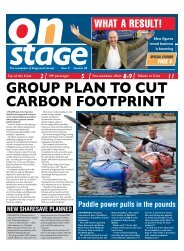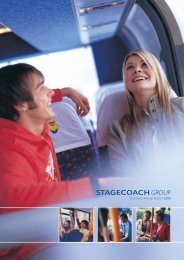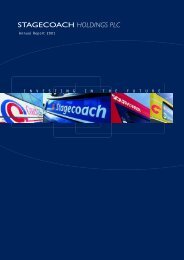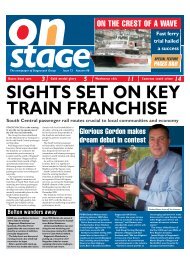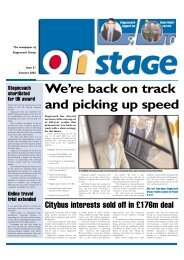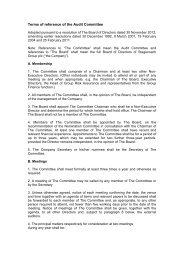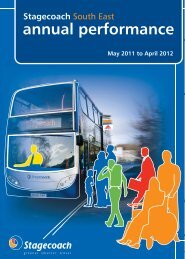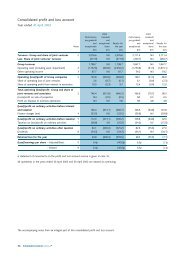Building a sustainable environment Stagecoach Group is committed ...
Building a sustainable environment Stagecoach Group is committed ...
Building a sustainable environment Stagecoach Group is committed ...
Create successful ePaper yourself
Turn your PDF publications into a flip-book with our unique Google optimized e-Paper software.
<strong>Building</strong> a <strong>sustainable</strong> <strong>environment</strong><br />
<strong>Stagecoach</strong> <strong>Group</strong> <strong>is</strong> <strong>committed</strong> to making continuing progress in improving the<br />
<strong>environment</strong>al management of its operations and helping to build a <strong>sustainable</strong> <strong>environment</strong>.<br />
Across our global operations, we provide support and training for our employees to ensure<br />
compliance with leg<strong>is</strong>lation, as well as effective waste management, and improved energy<br />
consumption and <strong>environment</strong>al performance.<br />
Our Environmental Policy sets out our commitment to good <strong>environment</strong>al stewardship and<br />
we have put in place stretching targets to reduce em<strong>is</strong>sions, cut water and energy<br />
consumption, minim<strong>is</strong>e waste and identify opportunities for recycling.<br />
<strong>Stagecoach</strong> has made further progress th<strong>is</strong> year in improving the <strong>environment</strong>al management<br />
of our operations and helping to build a <strong>sustainable</strong> <strong>environment</strong>. We believe public transport<br />
can play a significant part in reducing pollution, cutting congestion and contributing to a higher<br />
quality of life in our communities. <strong>Stagecoach</strong> <strong>is</strong> also taking steps to ensure its operations are<br />
carried out in a responsible manner.<br />
We have worked closely with consultants Arthur D Little to measure the <strong>environment</strong>al impact<br />
of our transport operations in the past 12 months. Arthur D Little have also ass<strong>is</strong>ted in setting<br />
new stretching targets as part of our commitment to good <strong>environment</strong>al stewardship. These<br />
key performance indicators cover reductions in em<strong>is</strong>sions, lower water and energy<br />
consumption, minim<strong>is</strong>ing waste and identifying opportunities for recycling.<br />
Our internal processes designed to track <strong>environment</strong>al data have been further strengthened<br />
th<strong>is</strong> year and have extended the measurement of our performance to cover our operations in<br />
Canada . New Zealand operations, which were divested in December 2005, are not included<br />
in the data for the year ended 30 April 2006.<br />
The table below outlines the <strong>Group</strong>’s performance against a range of <strong>environment</strong>al<br />
performance indicators for the 12 months to 30 April 2006 and the corresponding data for<br />
previous years.<br />
Th<strong>is</strong> reporting year we have made some modifications to our calculations in some areas to<br />
reflect more accurately the impact of improvements to our bus and train fleets on em<strong>is</strong>sions<br />
per passenger journey. Specific notes on the changes are l<strong>is</strong>ted below.<br />
2003-4 1 2004-5 1 2005-6 2<br />
Direct em<strong>is</strong>sions<br />
CO2 kg/ppj - bus 0.72 0.66 0.58<br />
CO2 kg/ppj - train 0.61 0.58 0.07<br />
CO g/ppj - bus 3.30 2.38 2.89<br />
CO g/ppj - train 13.27 11.63 0.58<br />
NOx g/ppj - bus 9.87 8.49 8.22<br />
NOx g/ppj - train 59.69 52.34 2.62<br />
PM10 g/ppj - bus 0.44 0.32 0.31<br />
PM10 g/ppj - train 0.33 0.29 0.01<br />
VOCs g/ppj - bus 1.17 0.91 1.05<br />
VOCs g/ppj - train 1.72 1.50 0.08<br />
Indirect em<strong>is</strong>sions<br />
CO2 kg/ppj - bus 0.41 0.39 0.01<br />
CO2 kg/ppj - train 1.28 1.20 1.37
CO2 tonnes - bus operations 1,918.18 1,842.74 0.00<br />
CO2 tonnes - bus depots and offices 21,313.48 21,640.72 20,529.06<br />
CO2 tonnes - train operations 190,230.34 207,461.35 222,407.61<br />
CO2 tonnes - train depots and offices 14,990.99 15,336.77 15,352.57<br />
CO2 tonnes - all depots and offices 36,304 36,977 35,882<br />
Water consumption<br />
Water m3/ppj - bus 0.0012 0.0011 0.0005<br />
Water m3/ppj - train 0.0020 0.0018 0.0018<br />
Waste<br />
Vehicle maintenance waste kg/ppj - bus 0.005 0.005 0.002<br />
Vehicle maintenance waste kg/ppj - train 0.038 0.035 0.006<br />
Other waste kg/ppj - bus 0.025 0.022 0.002<br />
Other waste kg/ppj - train 0.062 0.055 0.027<br />
Total waste generated - tonnes 25,313.26 25,402.38 11,584.04<br />
Recycling<br />
% recycled - bus 20.44% 31.88% 28.99%<br />
% recycled - train 5.53% 6.18% 40.00%<br />
% Maintenance waste recycled - bus 44.54% 46.88% 58.00%<br />
% Maintenance waste recycled - train 12.13% 13.59% 0.00%<br />
% Maintenance waste recycled - overall 25.98% 27.23% 29.00%<br />
1 Notes to the 2003-4 and 2004-5 Figures (PDF: 64.4KB)<br />
2 Notes to the 2005-6 Figures (PDF: 64.4KB)<br />
Direct em<strong>is</strong>sions<br />
We have delivered further improvement in the direct em<strong>is</strong>sions per passenger journey from<br />
our bus and train fleets. Th<strong>is</strong> has been achieved through our investment in new vehicles and<br />
rolling stock, as well as through the use of new fuels and cleaner technologies.<br />
<strong>Stagecoach</strong> has ordered a number of new Euro 4 engined vehicles for our bus operations in<br />
the UK , which have the potential to deliver improved fuel consumption and engine reliability.<br />
The use of biodiesel has been increased to around 1,800 buses in the UK and we are<br />
continuing to use the Envirox fuel additive across our UK Bus fleet.<br />
<strong>Stagecoach</strong> <strong>is</strong> also involved in a number of projects to fit exhaust gas recirculation systems to<br />
some of our vehicles in the UK. More than 1500 of our buses in the UK are now fitted with<br />
CRTs, a 24% increase from 30 April 2005. In our North American operations, we are the first<br />
company in New York to fit our buses for use with low sulphur fuel, which significantly<br />
reduces em<strong>is</strong>sions. The <strong>Group</strong> has also introduced more accurate calculation methods to<br />
assess our performance in the area of direct em<strong>is</strong>sions, particularly in our UK Rail div<strong>is</strong>ion.<br />
Indirect em<strong>is</strong>sions<br />
Indirect em<strong>is</strong>sions from our bus operations on a per passenger journey bas<strong>is</strong> have dropped<br />
significantly over the past 12 months. As well as being influenced by the growth in passenger<br />
volumes, th<strong>is</strong> has been ass<strong>is</strong>ted in particular by ongoing efforts to reduce energy<br />
consumption at our UK Bus sites.
We are working with Manchester-based Vickers Electronic Limited to introduce a special<strong>is</strong>t<br />
Energy Management System, which <strong>is</strong> in use at more than 50 sites. As well as cost savings,<br />
the system <strong>is</strong> benefiting the <strong>environment</strong>. Consumption savings at 29 gas-fired <strong>Stagecoach</strong><br />
sites are running at more than 11,000,000 kWh per annum, which represents an em<strong>is</strong>sions<br />
reduction of more than 4,000 tonnes of carbon dioxide per year.<br />
While indirect em<strong>is</strong>sions per passenger journey and in total have increased in our rail<br />
operations, th<strong>is</strong> reflects the continued introduction of Desiro trains. As well as offering a<br />
greatly improved travelling experience for passengers, these state-of-the-art trains use higher<br />
levels of electricity than earlier rolling stock.<br />
Since 2003, the <strong>Group</strong>'s indirect em<strong>is</strong>sions from energy consumption at offices and depots<br />
have reduced by 14.4%.<br />
Water consumption<br />
Water consumption in our bus operations has reduced per passenger journey by more than<br />
50%, ass<strong>is</strong>ted by the introduction of upgraded wash facilities, better wash management and<br />
initiatives to identify and repair water system leaks.<br />
The water consumption at our rail operations on a per passenger journey bas<strong>is</strong> has remained<br />
at similar levels to the previous year.<br />
Waste<br />
The <strong>Group</strong> <strong>is</strong> continuing to focus on improving the collection of data around the production of<br />
vehicle maintenance and other waste in its UK and North American operations.<br />
South West Trains, for example, has introduced a complete waste management system<br />
called Garbology where pressure crushers are used to compress waste and maxim<strong>is</strong>e the<br />
space available for waste d<strong>is</strong>posal. We are also reviewing what measures can be taken to<br />
increase the proportion of waste recycled from our bus and rail operations.<br />
While waste recycled from our rail operations has increased from 6.2% in the 12 months to 30<br />
April 2005 to 40.0%, in the 12 months to 30 April 2006, waste recycled from our bus<br />
operations has dropped from 31.9% in the 12 months to 30 April 2005 to 29% in the 12<br />
months to 30 April 2006.<br />
Training and best practice<br />
Across our operations, we provide support and training for our employees to ensure<br />
compliance with leg<strong>is</strong>lation, as well as effective waste management, and improved energy<br />
consumption and <strong>environment</strong>al performance.<br />
The <strong>environment</strong>al training programme at our UK Bus div<strong>is</strong>ion has been fully rev<strong>is</strong>ed. Around<br />
200 depot managers, safety representatives and superv<strong>is</strong>ors have been trained in the last two<br />
years, with all key personnel to be trained every three years on a rolling programme.<br />
In Manchester , a campaign <strong>is</strong> currently underway on all new double deck vehicles to reduce<br />
engine idling time to a maximum of 15 minutes, after which the engine will shut down.<br />
We have also continued our support for the road safety charity Brake and other organ<strong>is</strong>ations<br />
to benchmark and share good practice in safe driving and driving methods designed to<br />
improve fuel efficiency.
At South West Trains, Wimbledon Traincare depot has achieved ISO14001 accreditation and<br />
other units are currently being assessed by the Brit<strong>is</strong>h Standards Institute as part of our<br />
commitment to continuous improvement in <strong>environment</strong>al management.<br />
Compliance and <strong>environment</strong>al incidents<br />
We are pleased to report that there have been no notifiable <strong>environment</strong>al incidents (2005:<br />
zero incidents), no breaches in <strong>environment</strong>al obligations (2005: zero breaches), no<br />
enforcement notices (2005: zero notices), and no prosecutions (2005: zero prosecutions)<br />
during the year in our UK Bus, South West Trains, Supertram, or North American operations.<br />
The Island Line rail franch<strong>is</strong>e had no notifiable <strong>environment</strong>al incidents. One breach in<br />
<strong>environment</strong>al obligations was recorded in respect of a pest control <strong>is</strong>sue ra<strong>is</strong>ed by the Isle of<br />
Wight Council Environmental Health Department at the railway embankment on land near to<br />
Sandown Station. Th<strong>is</strong> was fully dealt with within the stipulated 14-day notice period.<br />
Coach USA reported a few <strong>environment</strong>al clean-ups due to road accidents. These have been<br />
fully recorded and affected materials d<strong>is</strong>posed of in line with relevant regulations.<br />
Travel plans<br />
In many areas, <strong>Stagecoach</strong> <strong>is</strong> working in partnership with major employers to help develop<br />
travel plans that reduce the dependence of employees on the car to get to work.<br />
Commitment to future progress<br />
<strong>Stagecoach</strong> has made further improvements and investment in the area of <strong>environment</strong>al<br />
sustainability over the past year, however we recogn<strong>is</strong>e that we can do more. We want to<br />
build on the progress we have made and, as part of our commitment, we have set new<br />
stretching <strong>environment</strong>al targets across our business.<br />
Progress against targets<br />
Zero breaches in <strong>environment</strong>al obligations,<br />
enforcement notices or prosecutions (Each<br />
year)<br />
Zero <strong>environment</strong>al incidents (Each year)<br />
Confirmed for UK Bus, South West Trains,<br />
Coach USA, Coach Canada, and<br />
Supertram. Island Line had one breach in<br />
<strong>environment</strong>al obligations, received from<br />
the Isle of Wight Council Environmental<br />
Health Department in respect of a pest<br />
control <strong>is</strong>sue at the railway embankment on<br />
land near to Sandown Station. Th<strong>is</strong> was<br />
fully dealt with within the 14 day notice<br />
period.<br />
Confirmed for UK Bus, Coach USA, Coach<br />
Canada, South West Trains, Island Line<br />
and Supertram.<br />
Achieve a continued reduction in direct em<strong>is</strong>sions to the atmosphere through:<br />
Continued upgrade of the fleet to meet<br />
latest em<strong>is</strong>sions standards (April 2005)<br />
Use of latest technologies e.g. CRTs,<br />
fuel additives, alternative vehicle fuels<br />
and fuel efficiency products/methods<br />
(April 2005)<br />
UK Bus now have 10 hybrid (Euro V or<br />
greater) buses in service. 1223 Euro III<br />
buses added to the UK Bus fleet since<br />
2003.<br />
1503 buses in the UK now fitted with CRTs,<br />
a 24% increase from 2004-5. Roll out of the<br />
Envirox fuel addiditive across the UK Bus<br />
fleet was completed in mid 2005. 10 hybrid<br />
buses now in service in the UK.
Driver training (April 2005)<br />
90% of vehicle washes to be fitted with<br />
reclaim/recycle units (April 2006)<br />
5% reduction in indirect em<strong>is</strong>sions from<br />
energy consumption at offices and depots<br />
(April 2006)<br />
5% reduction in all wastes generated and<br />
80% of maintenance generated waste<br />
being recycled (April 2006)<br />
To improve the quality and accuracy of the<br />
<strong>environment</strong>al data gathered resulting in<br />
external verification of 2003-4<br />
<strong>environment</strong>al performance data<br />
(September 2004)<br />
To implement an <strong>environment</strong>al<br />
management training program for all UK<br />
Bus depot managers (April 2005)<br />
To achieve ISO14001 accreditation for<br />
South West Trains (April 2007)<br />
Driver training package fully rev<strong>is</strong>ed. Trials<br />
being under taken in Manchester with<br />
vehicle management system, which<br />
highlights excessive braking and poor fuel<br />
economy by bus drivers (from 2004-5).<br />
UK Bus achieved th<strong>is</strong> target in 2003-4 with<br />
92% of vehicle washes fitted with reclaim<br />
units.<br />
Overall reduction so far (2003 to 2006) <strong>is</strong><br />
14.4%. Reduction achieved in 2005-6 was<br />
3%.<br />
% Maintenance waste recycled has<br />
reached 29% overall. Reduction in waste<br />
achieved, but not clear to what extent th<strong>is</strong> <strong>is</strong><br />
linked to more accurate reporting.<br />
UK Bus em<strong>is</strong>sions have been calculated<br />
based on the proportions of different types<br />
of bus in service (pre-Euro, Euro I, Euro II,<br />
Euro III) which allows a much more<br />
accurate calculation of em<strong>is</strong>sions.<br />
Supertram have improved waste monitoring<br />
and now publ<strong>is</strong>h figures on general waste.<br />
Waste calculations have improved for<br />
South West Trains and Island Line, using<br />
more specific factors from DEFRA and<br />
SITA to estimate weight to volume ratios.<br />
Environmental training programme fully<br />
rev<strong>is</strong>ed - c.200 depot managers, safety<br />
reps and superv<strong>is</strong>ors have been trained in<br />
the last two years, with all managers, reps<br />
and superv<strong>is</strong>ors to be trained every three<br />
years on a rolling programme.<br />
Wimbledon Traincare Depot has just<br />
obtained ISO 14001 accrediation. Brit<strong>is</strong>h<br />
Standards Institute are currently<br />
undertaking a programme of ISO 14001<br />
Accreditation Assessments at Farnham,<br />
Fratton, Bournemouth and Sal<strong>is</strong>bury<br />
Traincare Depots with the aim of these<br />
depots being ISO 14001 accrediated by<br />
October 2006.
NOTES TO THE 2003-4 AND 2004-5 FIGURES<br />
1. Em<strong>is</strong>sions for NZ ferries are not included as no em<strong>is</strong>sions factors are available.<br />
2. Bus and train em<strong>is</strong>sions factors from NAEI.<br />
3. Coach USA em<strong>is</strong>sions factors from Test results from the Northeast Advanced<br />
Vehicle Consortium (NAVC) Heavy Duty Vehicle Testing Project.<br />
4. Gas conversion factors from DEFRA Guidelines for Company Reporting on<br />
Greenhouse Gas em<strong>is</strong>sions.<br />
5. Effects of Enviros fuel additive not taken into account, as only affects part of<br />
2004-5 year.<br />
6. UK Bus PM10 em<strong>is</strong>sions take into account CRTs fitted - results in 90%<br />
reduction in PM10 (manufacturers figures).<br />
7. Electricity conversion factors from DEFRA Guidelines for Company Reporting<br />
on Greenhouse Gas em<strong>is</strong>sions.<br />
8. Coach USA figures for electricity, gas and water use are extrapolated from data<br />
for a proportion of the depots.<br />
9. Vehicle maintenance waste includes tyres, batteries, oil, scrap metal etc.<br />
10. Other waste <strong>is</strong> all remaining waste, including consumer waste.<br />
11. No waste data are available for Coach USA, and no maintenance waste data are<br />
available for Island Line.<br />
12. No recycling figures are available for Coach USA or Island Line.<br />
13. Recycling figure for Supertram <strong>is</strong> an estimate.


